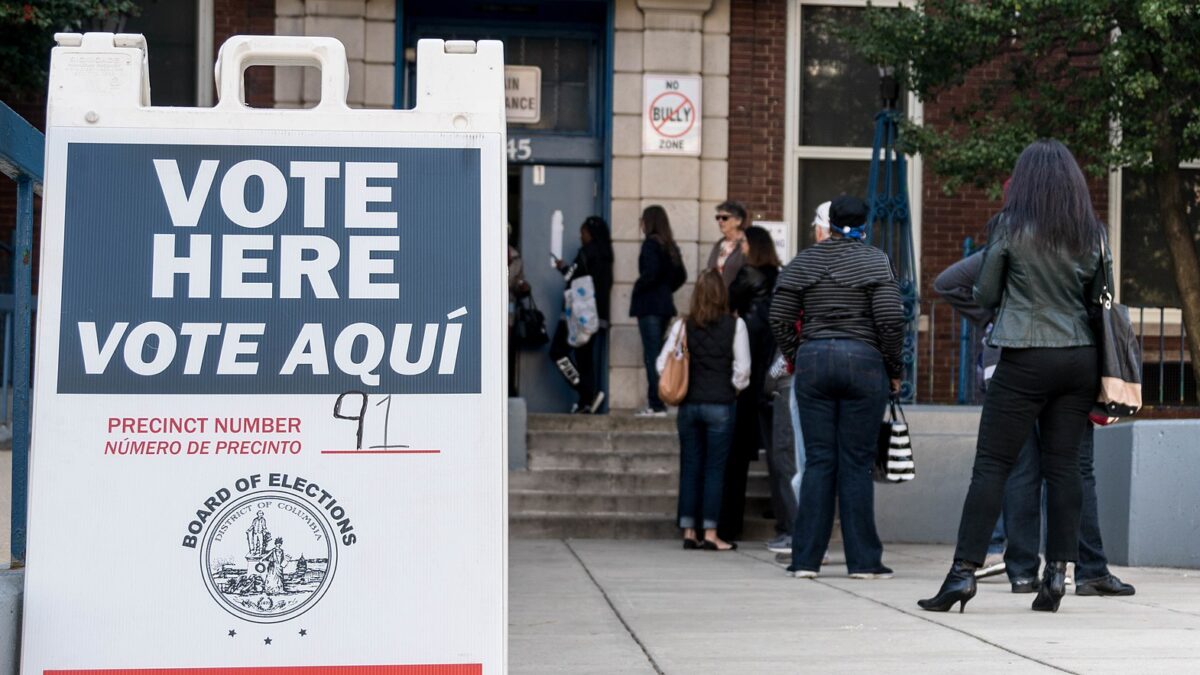A post from Elon Musk this week drew attention to the fact that no proof of citizenship is required to vote in federal elections in Arizona — but the real scandal is even more alarming.
On the surface, Musk is correct in his assertion that “Arizona clearly states that no proof of citizenship is required for federal elections.” But that’s not necessarily by the Grand Canyon State’s design.
Election law expert Hans von Spakovsky says Arizona can thank a bad 2013 U.S. Supreme Court ruling for the confusion.
The high court struck down an Arizona law that required voters to show proof of citizenship in national elections. In the majority opinion (7-2), the late Justice Antonin Scalia wrote that the state law conflicted with the 1993 National Voter Registration Act (NVRA), which mandates states “accept and use” the standardized federal voter registration form for national elections. The NVRA form, developed by the federal Election Assistance Commission, does not require proof of citizenship. It only asks an applicant “aver, under penalty of perjury, that he is a citizen.”
In other words, the honor system.
“No matter what procedural hurdles a State’s own form imposes, the Federal Form guarantees that a simple means of registering to vote in federal elections will be available,” Scalia wrote in Arizona v. Inter Tribal Council of Ariz., Inc.
Scalia added that demanding the use of the more involved state form for national elections would negate the purpose of the federal registration form.
“If that is so, the Federal Form ceases to perform any meaningful function, and would be a feeble means of ‘increas[ing] the number of eligible citizens who register to vote in elections for Federal office,'” wrote the late justice, a lion of conservative thought.
Scalia’s fellow conservative justices, Samuel Alito and Clarence Thomas, dissented. The late Justice Sandra Day O’Connor, whom Alito replaced, was on the federal appeals court panel that originally ruled on the case. O’Connor, a retired justice at the time, sat in from time to time on lower court panels. The Supreme Court affirmed the appeals court’s decision.
‘A Little Leeway’
Von Spakovsky, senior fellow in the Heritage Foundation’s Edwin Meese III Center for Legal and Judicial Studies, said Scalia left “a little leeway” in the opinion. The universality of the federal NVRA ends at the statehouse. While Arizona elections officials can’t require proof of citizenship for federal elections, they can — and do — require it for state contests.
“It is important to clarify that Arizona uniquely mandates documentary proof of citizenship for participating in statewide elections,” JP Martin, deputy communications director for the Arizona Secretary of State, said in a statement in response to The Federalist’s request for comment. “This requirement is distinct from federal election protocols, where Arizona aligns with national standards. To register, an individual must not only provide this documentary evidence but also affirmatively attest to their citizenship status by checking the appropriate box.”
Leftists have attacked proof of citizen requirements at every turn.
In 2022, President Joe Biden’s Department of Justice sued the Grand Canyon State in an attempt to kill a related law that requires applicants using the federal voter registration form to show proof of citizenship to vote for president. That law also requires citizenship proof to vote by mail, a morass of election integrity pitfalls that exploded during Covid hysteria.
Then-Republican Gov. Doug Ducey signed the law before leaving office. His successor, Democrat Gov. Katie Hobbs, served as Arizona’s far-left and highly partisan secretary of state and top election official while she was running for governor in 2022.
In its lawsuit, the DOJ argued that Arizona’s enhanced proof of citizenship law stood in direct conflict with the voter registration law and the 2013 Supreme Court ruling. Last fall, U.S. District Judge Susan Bolton blocked the provisions from being enforced while litigation is ongoing.
Von Spakovsky said the Supreme Court ruling was a “stupid interpretation” of the National Voter Registration Act, and the Republican-controlled Arizona legislature has admirably attempted to get around a “bad decision.” That’s why House Republicans are pushing passage of the American Confidence in Elections (ACE) Act, which would amend the NVRA.
Committee on House Administration Chairman Bryan Steil, a Republican from Wisconsin, introduced the legislation last summer in Atlanta, which has seen its share of election integrity concerns.
“The ACE Act is the most conservative election integrity legislation to be considered in the House in a generation,” the lawmaker said. “As we saw in Georgia, when you pass strong election integrity legislation that makes it easier to vote and hard to cheat, Americans have more confidence in their elections and voter participation increases.”
Among other provisions, the bill would give states broader tools to confirm citizenship.
The problem is, who’s watching the gates?
Arizona’s Voter Rolls Provide a Recipe for Disaster
Lest you think the federal government bears all responsibility for potential noncitizens casting votes in Arizona, making matters worse is the fact that Arizona’s voter rolls are a mess. The state’s Democrat Secretary of State Adrian Fontes, like Hobbs, has failed to do critical voter list maintenance. More than a dozen Arizona counties appear to be in violation of Section 8 of the National Voter Registration Act (NVRA), which mandates states keep accurate and current voter rolls for elections for federal office.
“It is apparent that Secretary of State Adrian Fontes and his predecessor have failed to perform the necessary voter list maintenance required by state and federal law,” Arizona voter Scot Mussi said in an August press release from the Honest Elections Project.
As I reported in these pages earlier this week, concerns about the clotted voter rolls are only heightened by a flood of illegal immigrants pouring into the southwest border state.
A report published last year by the Public Interest Legal Foundation found that at least 222 noncitizens had been removed from voter rolls in massive Maricopa County since 2015 — with the obvious implication being that those hundreds of noncitizens had been on the voter rolls previously. Nine of them, and perhaps more, had filled out ballots in federal elections.
AZ Free News reported last year that in two quarterly reports issued to the state legislature, the secretary of state’s office noted that it had received reports of more than 78,200 potentially invalid voters. The numbers included more than 1,300 individuals “who admitted to not being a citizen on a jury questionnaire”; and north of 23,600 people “who admitted to not being a resident of a county on a jury questionnaire.”
Biden claimed victory in the Grand Canyon State by 10,457 votes, or a fraction of a percentage point of the 3.4 million ballots cast.
Von Spakovsky and other election integrity experts say messy voter rolls, loose requirements in proving citizenship at the federal level, and the left’s relentless campaign to expand voting rights to noncitizens as illegal immigrants pour in is a recipe for disaster.
“It makes it extremely easy for aliens to register to vote,” said von Spakovsky, a former member of the Federal Elections Commission.
The left’s response — that illegal immigrants wouldn’t risk a felony charge for lying on an election form — disregards the fact that the immigrant’s first act on U.S. soil is already breaking U.S. law.
“And the chances of getting caught are just about nil,” von Spakovsky added.








